Sophia Shao
3DGS$^2$-TR: Scalable Second-Order Trust-Region Method for 3D Gaussian Splatting
Jan 30, 2026Abstract:We propose 3DGS$^2$-TR,a second-order optimizer for accelerating the scene training problem in 3D Gaussian Splatting (3DGS). Unlike existing second-order approaches that rely on explicit or dense curvature representations, such as 3DGS-LM (Höllein et al., 2025) or 3DGS2 (Lan et al., 2025), our method approximates curvature using only the diagonal of the Hessian matrix, efficiently via Hutchinson's method. Our approach is fully matrix-free and has the same complexity as ADAM (Kingma, 2024), $O(n)$ in both computation and memory costs. To ensure stable optimization in the presence of strong nonlinearity in the 3DGS rasterization process, we introduce a parameter-wise trust-region technique based on the squared Hellinger distance, regularizing updates to Gaussian parameters. Under identical parameter initialization and without densification, 3DGS$^2$-TR is able to achieve better reconstruction quality on standard datasets, using 50% fewer training iterations compared to ADAM, while incurring less than 1GB of peak GPU memory overhead (17% more than ADAM and 85% less than 3DGS-LM), enabling scalability to very large scenes and potentially to distributed training settings.
LangWBC: Language-directed Humanoid Whole-Body Control via End-to-end Learning
Apr 30, 2025Abstract:General-purpose humanoid robots are expected to interact intuitively with humans, enabling seamless integration into daily life. Natural language provides the most accessible medium for this purpose. However, translating language into humanoid whole-body motion remains a significant challenge, primarily due to the gap between linguistic understanding and physical actions. In this work, we present an end-to-end, language-directed policy for real-world humanoid whole-body control. Our approach combines reinforcement learning with policy distillation, allowing a single neural network to interpret language commands and execute corresponding physical actions directly. To enhance motion diversity and compositionality, we incorporate a Conditional Variational Autoencoder (CVAE) structure. The resulting policy achieves agile and versatile whole-body behaviors conditioned on language inputs, with smooth transitions between various motions, enabling adaptation to linguistic variations and the emergence of novel motions. We validate the efficacy and generalizability of our method through extensive simulations and real-world experiments, demonstrating robust whole-body control. Please see our website at LangWBC.github.io for more information.
Demonstrating Berkeley Humanoid Lite: An Open-source, Accessible, and Customizable 3D-printed Humanoid Robot
Apr 24, 2025Abstract:Despite significant interest and advancements in humanoid robotics, most existing commercially available hardware remains high-cost, closed-source, and non-transparent within the robotics community. This lack of accessibility and customization hinders the growth of the field and the broader development of humanoid technologies. To address these challenges and promote democratization in humanoid robotics, we demonstrate Berkeley Humanoid Lite, an open-source humanoid robot designed to be accessible, customizable, and beneficial for the entire community. The core of this design is a modular 3D-printed gearbox for the actuators and robot body. All components can be sourced from widely available e-commerce platforms and fabricated using standard desktop 3D printers, keeping the total hardware cost under $5,000 (based on U.S. market prices). The design emphasizes modularity and ease of fabrication. To address the inherent limitations of 3D-printed gearboxes, such as reduced strength and durability compared to metal alternatives, we adopted a cycloidal gear design, which provides an optimal form factor in this context. Extensive testing was conducted on the 3D-printed actuators to validate their durability and alleviate concerns about the reliability of plastic components. To demonstrate the capabilities of Berkeley Humanoid Lite, we conducted a series of experiments, including the development of a locomotion controller using reinforcement learning. These experiments successfully showcased zero-shot policy transfer from simulation to hardware, highlighting the platform's suitability for research validation. By fully open-sourcing the hardware design, embedded code, and training and deployment frameworks, we aim for Berkeley Humanoid Lite to serve as a pivotal step toward democratizing the development of humanoid robotics. All resources are available at https://lite.berkeley-humanoid.org.
FGMP: Fine-Grained Mixed-Precision Weight and Activation Quantization for Hardware-Accelerated LLM Inference
Apr 19, 2025Abstract:Quantization is a powerful tool to improve large language model (LLM) inference efficiency by utilizing more energy-efficient low-precision datapaths and reducing memory footprint. However, accurately quantizing LLM weights and activations to low precision is challenging without degrading model accuracy. We propose fine-grained mixed precision (FGMP) quantization, a post-training mixed-precision quantization hardware-software co-design methodology that maintains accuracy while quantizing the majority of weights and activations to reduced precision. Our work makes the following contributions: 1) We develop a policy that uses the perturbation in each value, weighted by the Fisher information, to select which weight and activation blocks to keep in higher precision. This approach preserves accuracy by identifying which weight and activation blocks need to be retained in higher precision to minimize the perturbation in the model loss. 2) We also propose a sensitivity-weighted clipping approach for fine-grained quantization which helps retain accuracy for blocks that are quantized to low precision. 3) We then propose hardware augmentations to leverage the efficiency benefits of FGMP quantization. Our hardware implementation encompasses i) datapath support for FGMP at block granularity, and ii) a mixed-precision activation quantization unit to assign activation blocks to high or low precision on the fly with minimal runtime and energy overhead. Our design, prototyped using NVFP4 (an FP4 format with microscaling) as the low-precision datatype and FP8 as the high-precision datatype, facilitates efficient FGMP quantization, attaining <1% perplexity degradation on Wikitext-103 for the Llama-2-7B model relative to an all-FP8 baseline design while consuming 14% less energy during inference and requiring 30% less weight memory.
ETS: Efficient Tree Search for Inference-Time Scaling
Feb 19, 2025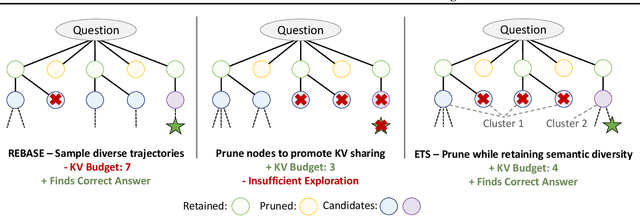
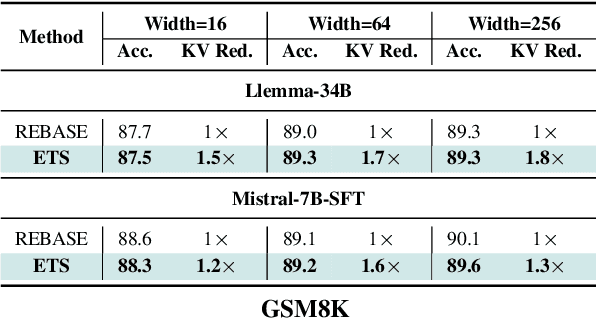
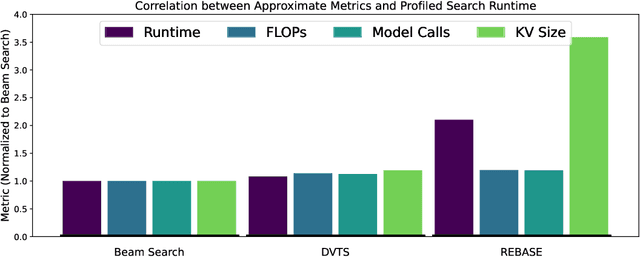

Abstract:Test-time compute scaling has emerged as a new axis along which to improve model accuracy, where additional computation is used at inference time to allow the model to think longer for more challenging problems. One promising approach for test-time compute scaling is search against a process reward model, where a model generates multiple potential candidates at each step of the search, and these partial trajectories are then scored by a separate reward model in order to guide the search process. The diversity of trajectories in the tree search process affects the accuracy of the search, since increasing diversity promotes more exploration. However, this diversity comes at a cost, as divergent trajectories have less KV sharing, which means they consume more memory and slow down the search process. Previous search methods either do not perform sufficient exploration, or else explore diverse trajectories but have high latency. We address this challenge by proposing Efficient Tree Search (ETS), which promotes KV sharing by pruning redundant trajectories while maintaining necessary diverse trajectories. ETS incorporates a linear programming cost model to promote KV cache sharing by penalizing the number of nodes retained, while incorporating a semantic coverage term into the cost model to ensure that we retain trajectories which are semantically different. We demonstrate how ETS can achieve 1.8$\times$ reduction in average KV cache size during the search process, leading to 1.4$\times$ increased throughput relative to prior state-of-the-art methods, with minimal accuracy degradation and without requiring any custom kernel implementation. Code is available at: https://github.com/SqueezeAILab/ETS.
DiffuseLoco: Real-Time Legged Locomotion Control with Diffusion from Offline Datasets
Apr 30, 2024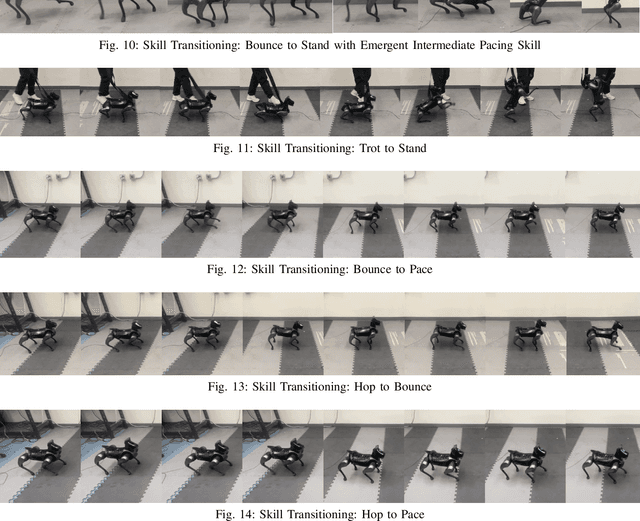
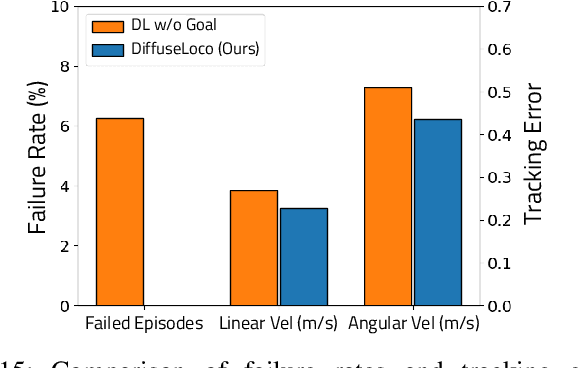
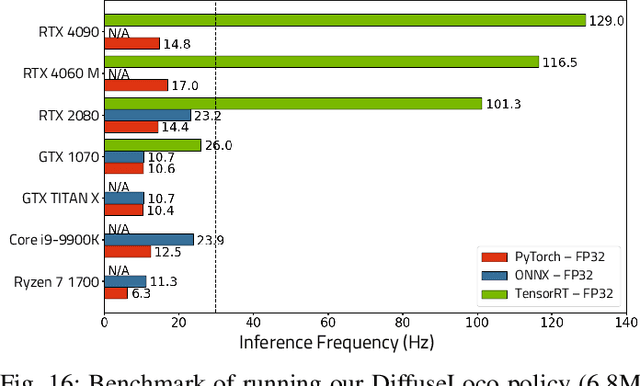
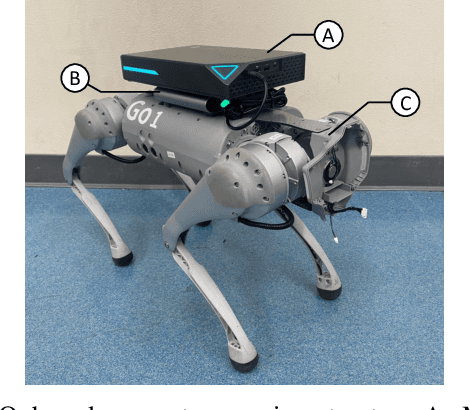
Abstract:This work introduces DiffuseLoco, a framework for training multi-skill diffusion-based policies for dynamic legged locomotion from offline datasets, enabling real-time control of diverse skills on robots in the real world. Offline learning at scale has led to breakthroughs in computer vision, natural language processing, and robotic manipulation domains. However, scaling up learning for legged robot locomotion, especially with multiple skills in a single policy, presents significant challenges for prior online reinforcement learning methods. To address this challenge, we propose a novel, scalable framework that leverages diffusion models to directly learn from offline multimodal datasets with a diverse set of locomotion skills. With design choices tailored for real-time control in dynamical systems, including receding horizon control and delayed inputs, DiffuseLoco is capable of reproducing multimodality in performing various locomotion skills, zero-shot transfer to real quadrupedal robots, and it can be deployed on edge computing devices. Furthermore, DiffuseLoco demonstrates free transitions between skills and robustness against environmental variations. Through extensive benchmarking in real-world experiments, DiffuseLoco exhibits better stability and velocity tracking performance compared to prior reinforcement learning and non-diffusion-based behavior cloning baselines. The design choices are validated via comprehensive ablation studies. This work opens new possibilities for scaling up learning-based legged locomotion controllers through the scaling of large, expressive models and diverse offline datasets.
SPEED: Speculative Pipelined Execution for Efficient Decoding
Oct 18, 2023Abstract:Generative Large Language Models (LLMs) based on the Transformer architecture have recently emerged as a dominant foundation model for a wide range of Natural Language Processing tasks. Nevertheless, their application in real-time scenarios has been highly restricted due to the significant inference latency associated with these models. This is particularly pronounced due to the autoregressive nature of generative LLM inference, where tokens are generated sequentially since each token depends on all previous output tokens. It is therefore challenging to achieve any token-level parallelism, making inference extremely memory-bound. In this work, we propose SPEED, which improves inference efficiency by speculatively executing multiple future tokens in parallel with the current token using predicted values based on early-layer hidden states. For Transformer decoders that employ parameter sharing, the memory operations for the tokens executing in parallel can be amortized, which allows us to accelerate generative LLM inference. We demonstrate the efficiency of our method in terms of latency reduction relative to model accuracy and demonstrate how speculation allows for training deeper decoders with parameter sharing with minimal runtime overhead.
 Add to Chrome
Add to Chrome Add to Firefox
Add to Firefox Add to Edge
Add to Edge